|
Like
his previous outings, film success crept up quietly behind
Stanley proving - as if we didn't know - that he could hack it
in the visual medium as well as he did on radio.
Not
exactly the world's largest portfolio he'd readily admit, but
one that undeniably hit a few peculiarly British zeitgeists
along the way.
Fun at St
Fanny's
Further Up
The Creek
Inn For Trouble
Carry On
Regardless
Hair of the Dog
Press For Time
Chitty
Chitty Bang Bang
Fun
at St Fanny's (director:
Maurice Elvey, 1956)
Stan's
first appearance on film came through Cardew 'The Cad' Robinson
who had heard his work on Radio Ruffles. Robinson had developed
his 'Cad' character through his St Fanny's scripts for 'Worker's
Playtime' and it was now making its big screen debut in this, a
sort of St Trinian's 'scam' farce co-starring and co-written (with Anthony Verney, based on a story by Peter Noble and Denis
Waldock) by Fred Emney.
Emney
plays the headmaster of a boarding school which can claim a
fortune if only they can get Robinson, a student and the
legitimate heir, expelled.
Stan
played an Art Gallery guide amongst a cast that also featured
Gerald 'Billy Bunter' Campion, Peter Butterworth and a young
Ronnie Corbett. top
Further
Up The Creek (director: Val Guest,
1958)
This
fairly swift follow up to the same year's 'Up The Creek' had Val
Guest at the helm once more and David Tomlinson reprising his
role as naive naval commander Lieutenant Fairweather. This time, the
luckless ship featured in 'UTC' had been sold off and
Fairweather had to complete the delivery, not knowing that bosun
Frankie Howerd (taking up the character played by Peter Sellers
in the previous film) had sold tickets on the ship for a luxury
cruise.
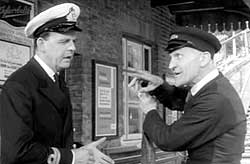
Stanley
(above right, with Tomlinson) appears in a brief scene as a
railway porter asking 'simply' whether Tomlinson wants his bags
in the back of a taxi. You can hear a clip of
the 'exchange' on the Audio
page.
The
cast also included British comedy repertory regulars Lionel
Jeffries, Thora Hird, Shirley Eaton, Sam Kydd, Michael Ripper and good old Esma
Cannon.
top
Inn
For Trouble (director: C M
Pennington-Richards, 1960)
Another
short cameo by Stan (below left) as a local farmer giving
directions (!) in this tale
of a provincial couple (David Kossoff, below right, and Peggy
Mount) who inherit a country pub, unaware that the Lord of the
Manor is nicking their trade by giving his own home brew away free.
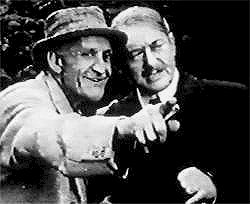
Directed
by the man in charge of 'Scrooge' (the '51 Alastair Sim
version), 'Tom Brown's Schooldays' (1951) and the original
'1984' (1956), other cast members neatly employed were Leslie
Phillips, Will Hay sidekick Graham Moffatt, Charles Hawtrey and
what must have been a very early appearance by one Edward
Woodward. top
Carry
On Regardless (director: Gerald
Thomas, 1961)
Variously
described (in 'Carry On' terms) as a hotch potch or a milestone,
'Regardless' was the fifth in the series and the first to not
hang its theme on a specific profession ('Sergeant', 'Nurse',
Teacher' and 'Constable' being the previous four), relying more on a series of sketches based around Sid James's 'Helping
Hands' agency.
And
it did have - at least in British comedy terms - a
stellar cast. Not only regulars James, Kenneth Williams (below
left), Charles
Hawtrey, Joan Sims and Kenneth Connor, but also Liz Fraser,
Fenella Fielding, Bill 'Compo' Owen (below centre), Ed 'Skippy' Devereaux,
Molly Weir, Norman Rossington, Nicholas Parsons, boxer Freddie
Mills, Patrick Cargill (excuse me while I draw some breath...),
David Lodge. Joan Hickson, Esma Cannon, Sydney Tafler and the
brilliant Jerry Desmonde.
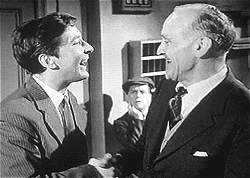
And,
of course, there was Stanley (above right) playing a fairly
fulcral part as the landlord of the building that houses
'Helping Hands' and a character described in Robert Ross's
exceptional Carry
On Companion as 'the linking force' for the film.
You'd
have thought that Stanley's particular skill would have sat
nicely as a regular gag in amongst the Carry On crew but this is
his only outing in the long-running franchise. When I asked him
why he didn't do any more, he said he felt that the team was
fairly tight knit and came across as a bit of a closed shop - a
feeling, he said, that the late Bill Owen shared at the time as
well.
Looking
at the film again, Stan's bits with James and Williams are much better
played and much more fluid than the pieces shot with just him
straight to camera, which are a bit edgy and unsure at times and
you get the feeling that there must have been some better takes
somewhere on the cutting room floor. In
any case, there are some great reaction lines from Sid and
Kenny:
KW
(to Sid, as Stan storms out after his first meeting): "Was
that a job? What did he want?"
Sid:
"A new set o' teeth, by the sound of it!"
After
Stan's third failed attempt to tell Sid that the lease was up
and he was selling the building, Williams, the HH polyglot,
steps into translate:
KW
(hearing Stan for the first time): "I understand! He 'Gobbledygooks'!"
Sid:
"I don't care what he eats!"
This
gives Williams the opportunity to slip in a few bits of his own
version of Unwinese and also sets the film up for its ensemble
finale - the agency can earn themselves a 99-year lease if they
do up a derelict property that Stan's just bought. Needless to
say it all goes terribly wrong but hey, luckily Stan did
want it demolished anyway!
"Carryokus!"
top
Hair
of the Dog (director:
Terry Bishop, 1961)
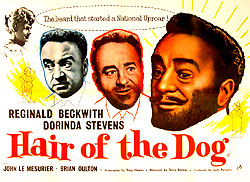
Hmmm, Don't know
an awful lot about this one, apart from it being a story about a
beardy commissionaire who causes a strike at a razor
manufacturing company. Somewhere in this unlikely plot, Stanley
plays a vicar.
Other notables
involved include Barbara Windsor and John Le Mesurier and the
film was directed by Terry Bishop, who also directed the
'William Tell' and 'Danger Man' UK TV series.
top
Press
For Time (director:
Robert Asher, 1966)
The genius that
is Norman Wisdom plays an incompetent reporter - whose
grandfather just happened to have been Prime Minister - covering
the parochial goings on in the fictional seaside town of
Tinmouth.
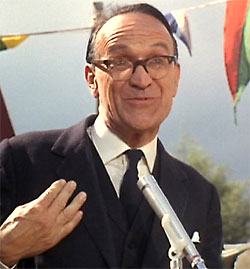
One of his first
jobs is to cover a local council meeting but unfortunately he
comes across Stanley as Town Clerk Mr Nottage and his attempts
at accurate note taking are completely buggered.
Stanley also
appears in a second scene (above) attempting to deliver a
welcoming address at the opening of a new housing estate, while
Wisdom goes about unintentionally demolishing virtually
everything around him.
(audio clip)
While not quite
reaching the comic zenith of Wisdom's earlier films, it's still
a good old laugh and his stunned reactions to Unwinese are
priceless.
top
|
Chitty
Chitty Bang Bang (director:
Ken Hughes, 1968)
This is probably the most high profile film
Stanley ever made. As such, he had quite a few interesting
things to say about it so I've given it its own page
here.
top
|
|



